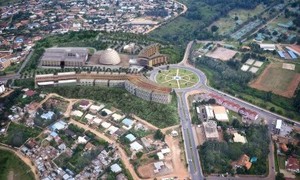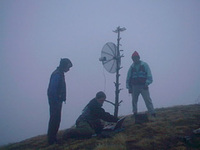The most powerful force in the world is communication.
This medium brings more of it within reach of more people than any medium has before. (Pictured, the capital of Rwanda.)
When George W. Bush was in Africa this week reporters were astounded by the number of people there who supported Barack Obama, who seemed to know all about him.
And why not? Africa is filled with Internet cafes. Africans don’t have to listen hopefully for a word from the BBC anymore. They can pick up The New York Times.
Recently I mentioned the idea that Obama should go to Kenya and try to sort out the growing crisis there. Turns out he’s been there, via radio. He made a statement and took questions at the end of last month. This has not yet had an impact, as the struggle has morphed into a tribe-on-tribe war over land. But he was there, and could be again, at any time.
It’s not just politics where this medium is making enormous change. It’s in every facet of life. The turnaround in Rwanda is being driven as much by information as anything else. The use of sympathy to reach markets, and the opening of an online stock exchange, is enabling capital to reach all of East Africa. Trouble in Kenya can now quickly move capital to Rwanda and vice versa. Rapid capital flows can create a gigantic incentive to make peace.
When you have access to the Internet you have access to all of the
Internet. Even the most pro-censorship regimes in the world allow
access to scientific sites, and technology sites, and markets where
goods are now available which never were before. The capability of the
Internet to educate is now available everywhere, language barriers
notwithstanding. You no longer go through intermediaries. You get it
from the horse’s mouth.
If you look at the Clustermap to
the left of this site you’ll get some idea of what I’m talking about.
This is not a big site. It’s a personal blog which has had fewer than
100,000 visitors since May. But there are readers coming here from
India and Pakistan, from China and the Amazon, from Indonesia and the
center of Algeria. Just one site, one fairly ordinary personal blog.
Now multiply that impact by millions, by billions.
This is the real revolution of the 21st century, the truly
unstoppable force. Governments cannot agree on what may be censored,
and so nothing really can be. People in China who want to know what
Falun Gong is still learn. The idiot judge who tried to shut down
Wikileaks is learning the same thing.
But it’s not at the edge of controversy where the real story lies.
It’s in non-controversial areas. It’s in economic development, in the
spread of technology, in education, in the creation of new markets,
where the Internet’s rise is really being felt. Even in Zimbabwe people
can still rent someone’s cell phone and make a call, make a connection
to the world. Even in Nepal you can run WiFi to remote villages and connect the people there to the whole medium, at broadband speeds.
This is slowly having enormous effects:
- Values like tolerance and democracy are spreading to places which never knew them.
- Remote villages are being brought into world markets.
- Censorship is being routed-around, everywhere.
- Technology is spreading to areas which were untouched by the previous revolutions in broadcasting.
- No one is truly isolated anymore.
Back in the 20th century a lot of science fiction writers tried to
describe this world and saw it as entirely dystopian. It’s true that
information overload and emotional distance remain risks, especially in
the developed world.
But most of the world is not developed. Most people in the world
have barely joined the conversation. Most of the world is just starting
to listen to the rest of us, and gaining some confidence to speak in
turn. With words, with money, with resources both physical and mental.
Here in the U.S. the Web is now about 14 years old, a teenager. But
on much of the planet the Internet Era has barely begun. This will
transform us as nothing before ever has, and there is nothing — no
dictator, no judge, no economic or political force — which can stop
it.
The only way to stop it is by cutting a place off from the entire
world economy and increasingly, that’s a price no one can meet.













You have to admit that even in the most dystopian Cyberpunk, “the net” was a way to escape or route around the problems of the real world, not the cause of them.
You have to admit that even in the most dystopian Cyberpunk, “the net” was a way to escape or route around the problems of the real world, not the cause of them.
thank you men
thank you men
Interesting ! Thank you for sharing such a informative blog about The Unstoppable Power of Communication!
Keep sharing!
Keep up the good work!
Interesting ! Thank you for sharing such a informative blog about The Unstoppable Power of Communication!
Keep sharing!
Keep up the good work!
I agree wit this…the information is helpful. We must understand that communication is now a basic need. even in education, where e-learning and distance learning is gaining great importance
I agree wit this…the information is helpful. We must understand that communication is now a basic need. even in education, where e-learning and distance learning is gaining great importance
Well articulated, thanks for sharing.
Well articulated, thanks for sharing.
Well explained content. Communication is very essential in life. Not only has it facilitated interactions over the world, but has also made it possible for individuals to pursue dreams beyond their geographical reach. In academia for instance, varsities have heavily invested in very sophisticated communication technologies that has enabled them to access far markets.
Well explained content. Communication is very essential in life. Not only has it facilitated interactions over the world, but has also made it possible for individuals to pursue dreams beyond their geographical reach. In academia for instance, varsities have heavily invested in very sophisticated communication technologies that has enabled them to access far markets.
I agree. Institutions are investing more in technologies especially the Virtual Learning Environments VLEs
I agree. Institutions are investing more in technologies especially the Virtual Learning Environments VLEs
Dangerous tool too.
Dangerous tool too.
Communication is power and yes it is the most powerful force in the world
Communication is power and yes it is the most powerful force in the world
Communication is power indeed!
Communication is power indeed!
communication is all.
communication is all.